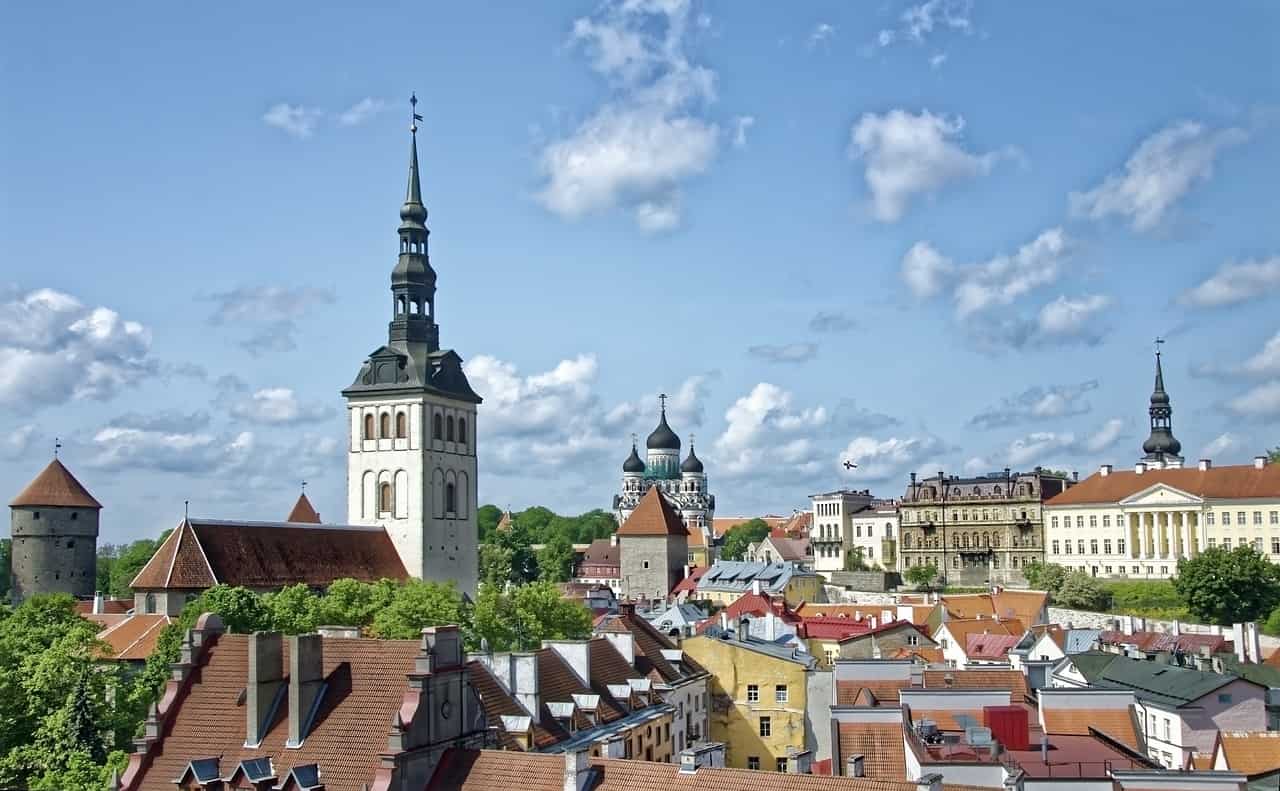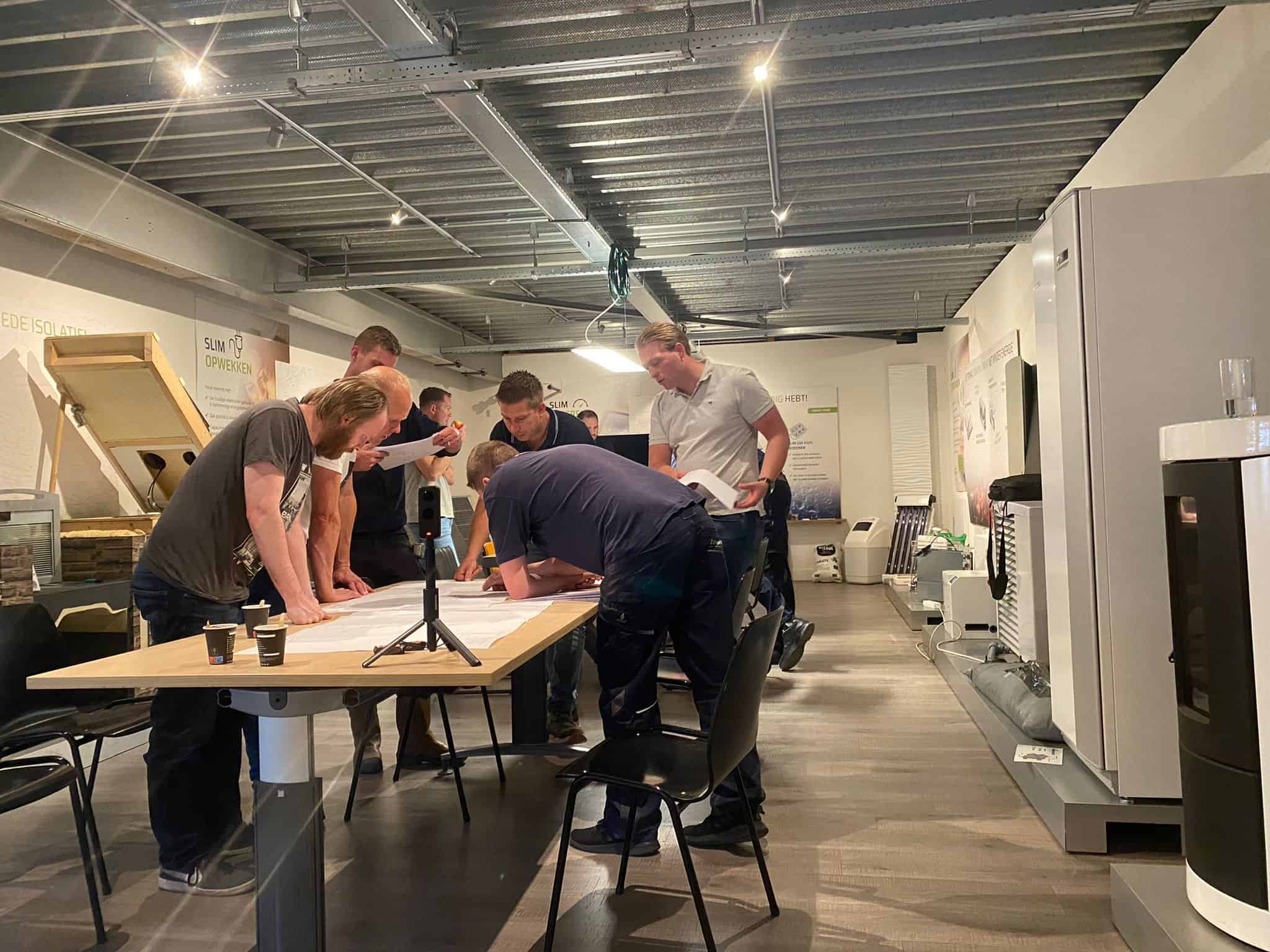
“On February 24, which is also Estonia’s Independence Day, the world changed forever,” said Lauri Kuusing, the Estonian ambassador to the Netherlands during the official inauguration. “In good times, you have got to have friends and build on friendships. That is why we are delighted that our friendship with Peter Kentie has built up over the years. We will take on challenges and opportunities together.”
This honorable moment for Kentie – in daily life the director of the city marketing organization Eindhoven365 – was accompanied by an elaborate program. For an Estonian trade delegation and a number of invited guests, a program was set up at the High Tech Campus in Eindhoven. Included were presentations about this ‘smartest square kilometer in Europe’, where open innovation is at the heart. The Estonian Tehnopol, Taltech University and Tartu Science Park campuses also gave presentations and Estonian start-ups gave pitches. The day was primarily devoted to establishing contacts between the two countries.
‘No time to be celebrating’
Eindhoven mayor John Jorritsma, in his address to the new Estonian honorary consul, noted that “it’s actually no time to be celebrating. We are all gathered here to congratulate Peter, but the war between Russia and Ukraine makes us feel very small. It is making us anxious.” That concern extends not only to Ukraine, but also to the Baltic States. “They are vulnerable with a next-door neighbor like Russia,” he said.
Just ESTonishing
The reason for this event is the ‘disruptive hobby’ of Kentie, which grew into a powerful brand for Estonia. In 2014, the city marketer, decided to research whether the method he used in developing the Eindhoven brand -which is based on open source and co-creation – would also work in a similar place. He ended up in Estonia.
“Unsolicited and uncommissioned, I based the campaign and brand on ‘EST‘; part of the country’s name.” The Estonians embraced his campaign “just ESTonishing“. In no time it was being seen everywhere. Kentie gave the concept to the Estonians as a gift in 2016. Ever since then, a fruitful cooperation has evolved and friendships have been formed. This was sealed last Tuesday with his appointment as honorary consul. “Economic diplomacy,” as Kentie calls it.
Watch Peter Kentie’s TED talk on An Estonising gift from Holland here.
Interaction
In addition to the ambassador, the Estonian Minister of Entrepreneurship and ICT, Andres Sutt, was in attendance on this day. For Minister Sutt, it is precisely these kinds of interactions that are needed to move humanity forward. “The more we interact with each other, and especially in these times, the more effectively we can use technology to make the world a better place.”
That is why it is very important for the minister that there are people like Peter Kentie. “People who are fans of Estonia, people who know what is going on in Europe and on a local level. People who can help us make the right connections. I really believe that the more interaction there is between people across the various levels of research and development, the more opportunities that this will provide for business.”
Estonia and the Netherlands are comparable in terms of surface area. The northern European country does have significantly fewer inhabitants, 1.3 million, compared to the 17.4 in the Netherlands. Since 1991, Estonia has been independent from Russia which borders the country to the east. Since this independence, the country has developed into one of the most digitally savvy countries in Europe. With a permanent threat of Russian hacks.
Pragmatic
The country succeeded in ensuring that every Estonian has a digital identity and almost one hundred percent of services there are digitalized. For example, the nurse at a hospital registers a baby. The system sees where the mother works and what kind of resources she is entitled to. “By the time she gets home, the allowance is in her account,” points out Jonas Onland, program leader for Digital Transformation & Europe and moderator for the day. “It’s set up so that everyone can always see who has viewed the data.”
For his work, Onland got to know Estonia intimately, he says. “The Estonians think very systemically: ‘How do you want to coexist with each other?’ They have translated that into legislation and technology. People are at the core and all government services are designed accordingly. There’s a very pragmatic culture.”
Voting is done digitally, for instance. Kentie: “A Dutch person would immediately say: `You’ll get hacked’. While Estonians say: ‘That’s right, but that’s not a problem.’ They have set it up so that you can recast your vote an unlimited number of times until one minute before the voting closes. If you’re hacked, you can change it immediately – although that hasn’t happened yet.”
Twenty-five Unicorns
Estonia is structured in such a way that bureaucracy is avoided as much as possible, says Estonian Minister Sutt. “I firmly believe that the government should not get in the way. You do have to set limits, but then you have to allow companies to grow.”
According to Sutt, Estonia and the Brainport region can complement each other. “We are strong on the software side. Both of us need hardware. There are wonderful and practical opportunities to work together.”

Just as is the case in the Brainport region, the number of start-ups in Estonia is growing. There is a difference, however as Estonia leads the way in the number of start-ups that turn into unicorns. So far, ten start-ups have reached one billion euros in value. The highest number in Europe.
For Sutt, it is simple. “It’s like the winning lottery ticket. To win it, you have to buy it. And in order to buy it, someone has to have a lottery. That’s exactly what we do in Estonia: we have a lottery and the tickets are free. It’s an invitation to come and innovate, try out ideas and experiment.”
The minister is aiming to bring the number of unicorns to twenty-five by 2025. “People called me crazy. But it could very well happen; we still have a while to go. You have to have an ambition and then the rest will follow.”
A better world
Estonia is also investing in the education system. “It forms the foundation of our people and talents,” says Raido Lember of the Estonia-based AES Invest. According to Lember, the key to Estonian success is the mentality that young people can change the world. “That really is the spark that runs right through the country. Young people who are trying to start big companies. In other countries, children say they want to be firefighters when they grow up. In our country, they want to set up a start-up, to change the world for the better.”
Among the Estonian delegation is the start-up Auvetech, which develops self-driving vehicles and autonomous transportation systems. Paula Johanna Adamson, Chief Sales Officer at the company, has been testing and working on their vehicles for about three weeks at the Future Mobility Park in Rotterdam. “The Netherlands already feels a bit like home to us. It is very similar to Estonia here. It is also innovation-oriented. We have the opportunity here to test and demonstrate our solutions in actual practice. All the connections that we are making here are bearing fruit.”
Encounters
Ambassador Kuusing has been in the Netherlands since September last year and has noticed that conversations are mostly about the digital footprint of Estonia. “But on the diplomatic front, we are not that far yet. Partly due to limited resources. We are pleased that we can rely on our network of honorary consuls. Therefore, we warmly welcome Peter Kentie as a new team member.”
Kentie views the role of honorary consul as an economic diplomat. He especially wants to bring Dutch and Estonian campuses, science parks and companies together. “Our consultation room at Eindhoven365 will function from now on as the office for the consulate of Brabant and Limburg. I am there to help expand activities and knowledge exchange about high tech between these two countries and to help develop start-ups. If someone shows up who has lost their passport, I’ll send them to the embassy in The Hague.”
His inauguration was already one of those occasions that brought people together. “The best thing would be when someone from Taltech University, for example, talks to someone from the High Tech Campus. That those encounters can take place is what my role as an economic diplomat is all about.”








